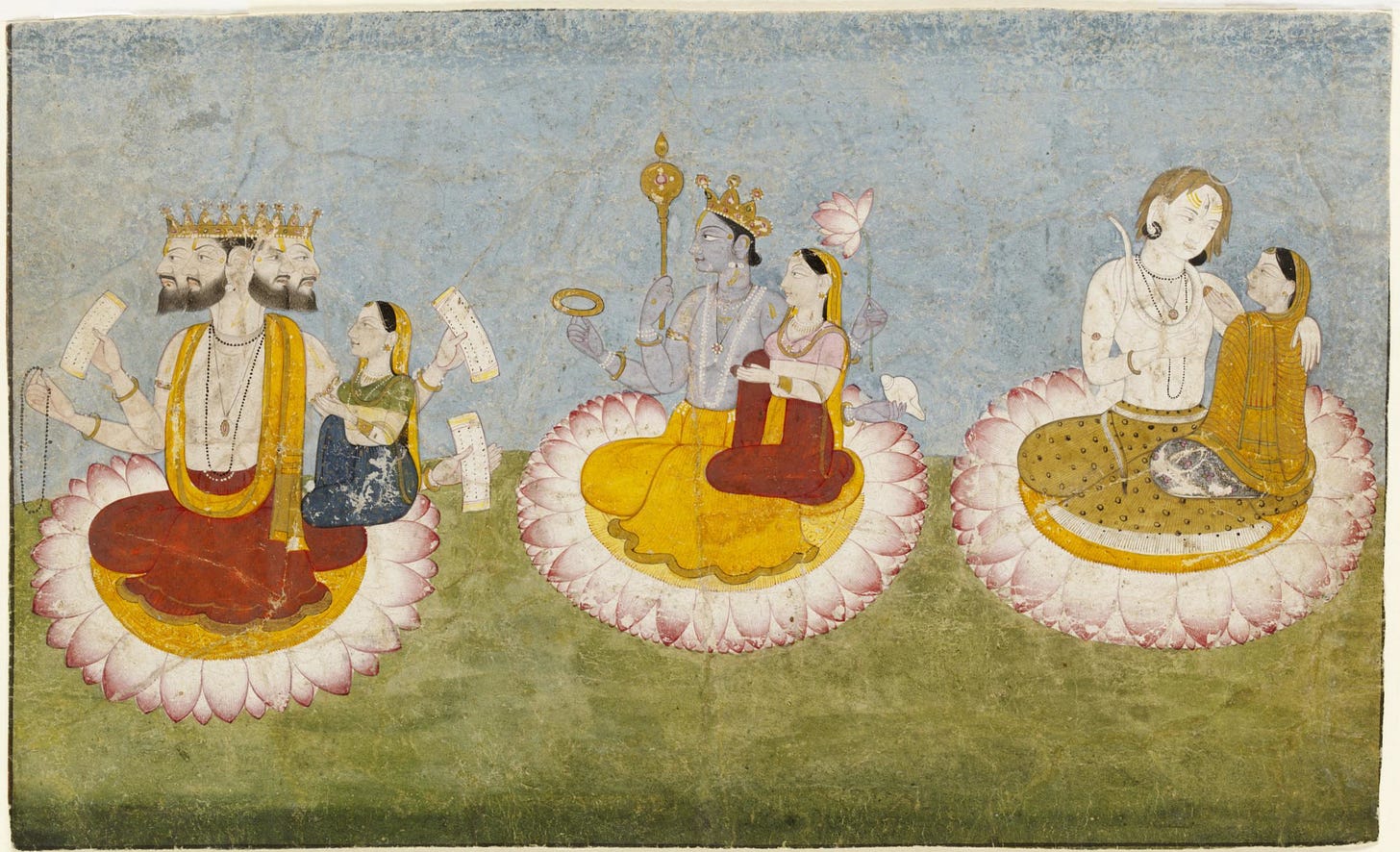The Christian Trinity and the Hindu Trimurti
"Two natures without confusion, without change, without division, without separation." (Chalcedon)
Brahma, Vishnu and Shiva seated on lotuses with their consorts, Saraswati, Lakshmi and Paravati respectively. ca 1770. Guler, India. Victoria and Albert Museum, London. Wikimedia Commons.
☩
The Christian dogma of the Trinity, which is so offensive to Jews and Muslims, evidently should find felicitous reception among Hindus. But is the difference between the three Persons of the Christian Trinity and the 330 million gods of Hinduism truly only a matter of degree and not of kind? No Person of the Christian Trinity is ever in conflict with or subordinate to the other, but the Hindu gods, including of its trinity of Brahma, Vishnu, and Shiva (the Trimurti-Triple Form), are ever warring with and vying amongst each other for dominance. The Persons of the Christian Trinity, however, are equal and consubstantial, are a harmonious unity in diversity, are a communion of love calling out to man, and are one single God.
The Christian understanding of salvation is different from the Hindu understanding of salvation, and consequently the Christian Trinity is not well comparable to the Hindu Trimurti and to the Hindu plurality of gods and goddesses. The Christian Trinity is bound up with an understanding of man's salvation through Christ. Christ, who is the Second Person of the Trinity, provides himself a body, incarnates, so as to suffer and die in sacrifice, in fulfilment of the sacrifices of the Mosaic Law, in obedience to the Father, in order to liberate man from sin and death, and to deify man. This atonement is only efficacious because of the radical unity of divinity and humanity in Christ, which redeems man in the flesh. Man cannot cleanse and liberate himself, and without the mystery of the Trinity there is no incarnation, and without the incarnation there and no salvific outreach of God to humanity. (Reardon 117-137)
Hindu avatars, such as Rama and Krishna who are avatars of Vishnu, do not have the same meaning as Christ's incarnation. Hindu avatars seem to come to teach the way to liberation, and to restore the dharma, that is, moral law. They come to show how to destroy the ego, the atman, through Yoga, through a process akin to cleaning a lamp covered with dirt and dust, and so to escape samsara into moksha, and to reunite with Brahman, Atman, God. This is not the same as Christ's sacrificial death, in love, to restore humanity to friendship with the Father, and consequently the nature of the Christian Trinity and of the Hindu Trimurti and plurality of gods, are not well comparable. In Christian understanding, man's corruption involves his entire being, man is in demonic slavery, man is in bondage to death and corruption, and man's salvation cannot be achieved through his own cleaning away of the dross so that his lamp shines forth in full glory.
Many of the Hindu gods who incarnate on earth are themselves seeking moksha, and are themselves entangled in and deceived by samsara. The story of Indra as a god deceived by the pleasures of samsara in wanton life as a pig, and who required divine intervention for reawakening to his true god-self, has no analog in Christ. Christ, who has two natures and two wills, human and divine, who is homoousios with and in complete harmony with the Father, does not come to remonstrate with us to clean ourselves up, but to save us.
"An illuminating story is told about Indra, who was once the King of the gods. He was forced by the other devas to descend to earth in the body of a boar. Once there, he began to enjoy the life, wallowing in the mud, mating, and siring baby pigs. The devas were aghast: They came down to try to convince him to return, but Indra had forgotten his kingly state and insisted on remaining as a boar. The devas tried killing his babies: he was distraught but simply mated to have more piglets. Then the devas killed his mate. Indra grieved his loss but stayed in the mud. They finally had to kill him as well to bring him back to his senses. His soul could then see the body of the boar it had been inhabiting and was glad to return to heaven. The moral is that we, too, are like gods who forget the heights from which we came, so intent are we on the joys and sorrows of earthly life." (Fisher 80)
Contrarily, Christ assumed a body to suffer and die in sacrifice for the salvation of the entire human race.
Citations
Fisher, Mary Pat. Living Religions. 7th ed, Prentice-Hall, 2008.
Reardon, Patrick Henry. Reclaiming the Atonement : An Orthodox Theology of Redemption. Ancient Faith Publishing, 2015.




